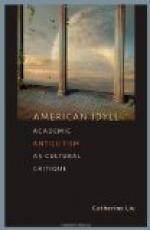“When the most astute critic of American labor conditions has said, ’While immigration continues in great volume, class lines will be forming and reforming, weak and instable. To prohibit or greatly restrict immigration would bring forth class conflict within a generation,’ what does it mean?
“President Woodrow Wilson in a statement of his fundamental beliefs has said: ’Why are we in the presence, why are we at the threshold, of a revolution? . . . Don’t you know that some man with eloquent tongue, without conscience, who did not care for the nation, could put this whole country into a flame? Don’t you know that this country, from one end to the other, believes that something is wrong? What an opportunity it would be for some man without conscience to spring up and say: “This is the way; follow me”—and lead in paths of destruction!’ What does it mean?
“The problem of the social unrest must seek for its source in all three classes of society! Two classes are employer and employee, the third is the great middle class, looking on. What is the relationship between the dominating employing figure in American industrial life and the men who work?
“A nation-wide antagonism to trade-unions, to the idea of collective bargaining between men and employer, cannot spring from a temperamental aversion of a mere individual, however powerful, be he Carnegie, Parry, or Post, or from the common opinion in a group such as the so-called Beef Trust, or the directorate of the United States Steel Corporation. Such a hostility, characterizing as it does one of the vitally important relationships in industrial production, must seek its reason-to-be in economic causes. Profits, market, financing, are placed in certain jeopardy by such a labor policy, and this risk is not continued, generation after generation, as a casual indulgence in temper. Deep below the strong charges against the unions of narrow self-interest and un-American limitation of output, dressed by the Citizens’ Alliance in the language of the Declaration of Independence, lies a quiet economic reason for the hostility. Just as slavery was about to go because it did not pay, and America stopped building a merchant marine because it was cheaper to hire England to transport American goods, so the American Trust, as soon as it had power, abolished the American trade-union because it found it costly. What then are these economic causes which account for the hostility?




